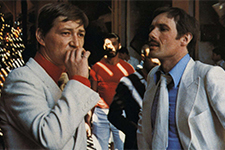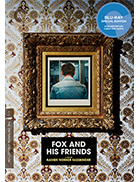Fox and His Friends (Faustrecht der Freiheit)
|  Rainer Werner Fassbinder’s acerbic cautionary tale Fox and His Friends (Faustrecht der Freiheit) came about during one of the prolific New German Cinema director’s most productive periods. To give you some sense of Fassbinder’s activity, Fox and His Friends was one of four feature-length films he produced in 1975 alone, the others being the television movies Fear of Fear and Like a Bird on a Wire, and the theatrically released Mother Küsters Goes to Heaven. During the previous four years, he had completed 18 feature-length films (both theatrical releases and made-for-TV movies) and a five-part mini-series. It was during this time that he had made some of his most highly regarded masterpieces, including what is arguably his best film Ali: Fear Eats the Soul (1974). Thus, it shouldn’t be too surprising that there is quite a bit of thematic and narrative redundancy in Fox and His Friends, which tells the story of a working-class nobody who wins the lottery and finds himself being exploited by the scurrilous members of the upper class who would otherwise pay him no attention. It’s another of Fassbinder’s doomed romances in which one person clearly loves more than the other and therefore opens himself up to being exploited, and part of the problem with Fox is that the central relationship is not particularly convincing. That is, it fits the dramatic requirements and dutifully fulfills its mission of acting as a microcosm for the insidious nature of social and economic manipulation (the English language title is certainly cynical in its deployment of the word friends, although the original German title, which translates as Survival of the Fittest, is perhaps even more cynical). But, it never feels real; rather, it feels like a narrative device. Fassbinder, who began as an actor before shifting to directing in the mid-1960s, cast himself as the proletariat protagonist, a naïve schlub named Franz Biberkopf who loses his job at the beginning of the film when the circus sideshow he works for is shut down by the police (he was billed as “Fox the Talking Head,” although we never get to see his show in action). A devoted purchaser of lottery tickets, he manages to hit the jackpot to the tune of 500,000 marks, which immediately elevates his social standing, although he has no real knowledge of how to move or act in the new social circles now open to him. He falls into a relationship with Eugen Thiess (Peter Chatel), the son of the owner of a book-binding company (Adrian Hoven) that is in financial trouble. Eugen works for his father, and Franz is so eager to stay in his romantic good graces that he agrees to loan the company a substantial amount of his money while spending other copious amounts on a fancy apartment and new furnishings for him and Eugen. Although he maintains connections with his working-class background, which include his bitter sister Hedwig (Christiane Maybach) and the regulars at a low-rent gay bar, he is always reaching upward and usually failing, much to Eugen’s embarrassment (he doesn’t know which fork to use at dinner, he doesn’t understand or appreciate opera, he has no sense of style or how to comport himself in elevated company, and so forth). At its best, Fox and His Friends is an effectively acerbic depiction of the underlying power of social class and how it both informs and dictates so much of our behavior and understanding of the world. Franz feigns being proud of his working-class origins, but we constantly sense his desire to be part of Eugen’s world, even though he can never quite figure out how to do it. There are moments of cringe-worthy embarrassment when Franz behaves impolitely, and Fassbinder’s performance makes him pitiable without being entirely pathetic. He’s not a particularly likeable character at first, and the manner in which he leads so brashly with his sexuality gives him a certain crudeness that is off-putting. Yet, as the story unfolds, his character gains levels of pathos that give the film’s depiction of social strata in conflict a sense of both critical depth and emotional discord. We feel for poor Franz, who is simply in over his head. At the same time, though, much of the film doesn’t work because the relationship between Franz and Eugen is so unconvincing. We understand on some level Franz’s infatuation with Eugen and his refined air, impeccable taste, and cool demeanor. Yet, not once in the film does Eugen display any real sense of affection toward Franz, to the point that it’s hard to believe that Franz, naïve and desperate though he may be, could possibly believe they’re in a romantic relationship. Their initial connection is entirely sexual, instigated aggressively by Franz, but it is never followed with any kind of persuasive emotional connection. Eugen seems at best to be tolerating Franz’s presence, and he frequently seems annoyed and ashamed, emotions that his social class dictate he keep largely repressed, lest he seems crude. This constant repression gives the film’s dramatic core an edge, but it also depletes our emotional engagement; it feels like too much set-up without any real follow-through, which is strange given the levels of emotional turmoil Fassbinder wrung out of Ali: Fear Eats the Soul the previous year (although the film’s closest cousin in his oeuvre is 1972’s The Bitter Tears of Petra von Kant, which was also about an exploitative interpersonal relationship). Despite its shortcomings, Fox and His Friends was an important film for Fassbinder, primarily because it was his first to be set entirely within Germany’s gay subculture. Gay characters had certainly appeared in his early films, but that milieu had never been presented with no social comment; it is simply the world in which the film takes place (as critic Ruth McCormick wrote in her review in Cineaste at the time of the film’s U.S. premiere in 1976, the fact that the protagonists are gay “is almost beside the point” in relation to the film’s depiction of class conflict). In an interview at the Cannes Film Festival, Fassbinder noted that Fox “is certainly the first film in which the characters are homosexuals without homosexuality being made into a problem. In films, plays or novels, if homosexuals appear, then homosexuality was the problem, or it was a comic turn. But here homosexuality is shown as completely normal, and the problem is something quite different.” Fassbinder was criticized by a number of gay activists and critics who felt that his depiction of their milieu as cloistered and catty was a regression, not a step forward. And, even if one points to the deployment of stereotypes and the lack of any sense of gay politics among the characters, it is still crucial for both Fassbinder’s body of work and European cinema that he used Fox and His Friends to break free of the need to make homosexuality a problem and simply present it as one facet of life.
Copyright © 2017 James Kendrick Thoughts? E-mail James Kendrick All images copyright © Rainer Werner Fassbinder Foundation and The Criterion Collection | |||||||||||||||||||||||||||||||||||
Overall Rating: 

 (2.5)
(2.5)


